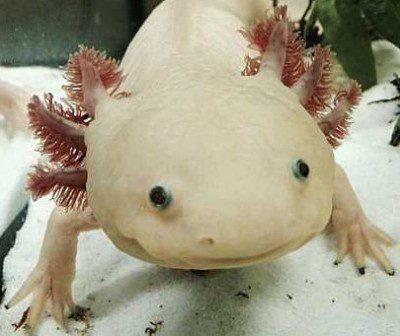Are you considering getting an axolotl? These cute little amphibians make very charming pets! Also known as the Mexican salamander or Mexican walking fish, axolotls are known for their ability to regenerate lost limbs … and for their adorable ‘smiling’ faces. In this article, a Conyers, GA vet discusses axolotl care basics.
Your little buddy will need at least a 10-gallon tank. Bigger is always better when it comes to pet habitats, so we recommend getting one that is at least 20 gallons. If you have more than one, calculate space requirements by about 10 gallons per axolotl. You’ll need to add a suitable substrate. Avoid using gravel or small pebbles, as they can be dangerous, even deadly, if ingested. Sand is fine for adults, but it isn’t safe for young axolotls. Axolotls can swallow things that are as large as their heads, so make sure any rocks you put in the tank are at least twice the size of your pet’s noggin. A good filtration system is crucial. As for accessories, you’ll want to add hidey-holes, caves, and plants. You can use plant pots or PVC pipes. Ask your vet for more information.
While you may need some light, especially if you want plants to grow in your pet’s tank, don’t use bright lights: they can be stressful to axolotls. These little guys can get frightened when lights turn on suddenly, so try to keep light levels low and consistent. You’ll also need to keep the water at the correct temperature. The tank should stay between 60-64 °F at all times. We recommend cycling the tank before you bring your pet home. This can take over a month, so plan in advance.
Earthworms are a great source of food for these cute pets. Be sure to buy organic, not wild-caught ones. Axolotls can also eat pellets, black worms, tuna, prawns, and bloodworms. (Note: bloodworms do get a bit messy.) Be sure to remove any uneaten food immediately: otherwise, it will contaminate the water. Ask your vet for specific advice.
Caring for axolotl larvae is much more complex than caring for adults. If you’ve never had these adorable pets before, you probably want to start out with a juvenile or adult. Ask your vet for more information.
Do you have questions about axolotl care? Contact us, your Conyers, GA vet clinic, today!

